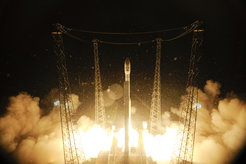Public event for LISA Pathfinder launch
Albert Einstein Institute invites media representatives and the general public for a launch event on December 3, 2015
On December 3 the LISA Pathfinder mission is launched into space on top of Vega rocket from the European spaceport in Kourou. LISA Pathfinder will demonstrate key technologies for measuring gravitational waves in space and pave the wave for future gravitational-wave detectors such as eLISA. The Albert Einstein Institute in Hannover is one of the leading partners for LISA Pathfinder and eLISA and invites all interested to a launch event in Hannover on the morning of December 3, 2015.
This press release has been updated: Due to technical difficulties with the launcher rocket, the LISA Pathfinder launch was postponed to December 3.
Address
Max Planck Institute for Gravitational Physics (Albert Einstein Institute) and Institute for Gravitational Physics of Leibniz Universität Hannover
Callinstr. 38
30167 Hannover
Schedule
- doors open at 4:35 CET
- welcome
- viewing of (English language) livestream from Kourou spaceport with rocket launch at 5:04 CET
- short presentation “LISA Pathfinder: erste Schritte zur Gravitationswellemessung im All”
- breakfast and coffee break
- optional: tours to the LISA Pathfinder Operations Room at the AEI Hannover
- exibits about LISA Pathfinder and eLISA
- viewing of (English language) livestream from the European Space Operations Centre (ESOC) in Darmstadt. At around 7 CET separation of the satellite from the launcher and mission begin; also presentations by LPF scientists (including Dr. Martin Hewitson from AEI Hannover)
- ends at around 8:20 CET
Registration
If your would like to be part of the excitement and watch the LISA Pathfinder launch together with scientists at the Albert Einstein Institute, please send an email with the subject “LISA Pathfinder Launch Event Hannover” to Benjamin Knispel. You may also call +49-(0)511-762-19104 to register.

LISA Pathfinder mission
Once the LPF mission reaches it target in space (1.5 million kilometers from the Earth towards the Sun), it will position, precisely measure and control two test masses in near perfect free fall. This is achieved through state-of-the-art technology comprising inertial sensors, a laser metrology system, a drag-free control system and an ultra-precise micro-propulsion system. All these technologies are crucial for future spaceborne gravitational wave detectors such as eLISA.
The Max Planck Institute for Gravitational Physics (Albert Einstein Institute/AEI) in Hannover played a leading role in the development and construction of the optical scientific instrumentation for LISA Pathfinder. Joint scientific leadership is held by Prof. Karsten Danzmann and Prof. Stefano Vitale from the University of Trento, Italy.
LISA Pathfinder is an ESA mission, with the European space industry under the overall integration responsibility of Airbus DS and research institutions from France, Germany, Italy, the Netherlands, Spain, Switzerland and Great Britain as well as NASA participating.
LISA Pathfinder is funded through the German Aerospace Center (Deutsches Zentrum für Luft- und Raumfahrt; DLR) by the Federal Ministry for Economic Affairs and Energy based on a resolution of the German Bundestag.












